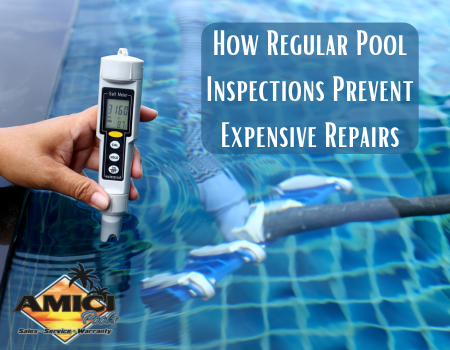Owning a pool is a wonderful way to enjoy relaxation and recreation, but it also comes with the responsibility of maintaining its condition. Pools, like any other part of your home, require regular care to ensure their longevity and safe operation. One of the most effective ways to protect your pool from costly repairs is through regular pool inspections. Here’s how scheduling routine pool inspections can help you avoid expensive repairs and keep your pool in top shape.
 1. Early Detection of Problems
1. Early Detection of Problems
One of the primary benefits of regular pool inspections is the early detection of issues that may not be immediately obvious to the untrained eye. Pools can develop a variety of problems over time, from equipment malfunctions to structural damage. Regular inspections ensure that these issues are identified before they become major concerns.
For instance, a small leak in the plumbing system or a minor crack in the pool’s surface may go unnoticed, but these problems can worsen over time, leading to significant damage and costly repairs. A professional inspector can identify and address these issues early, preventing further damage and saving you money in the long run.
2. Preventing Equipment Failures
The pump, filter, heater, and other pool equipment are crucial for the proper functioning of your pool. If any of these components fail, it can lead to more serious problems, such as poor water circulation, contamination, and even structural damage. Regular inspections help ensure that all equipment is in good working order.
During an inspection, a pool technician will check the performance of each piece of equipment, clean filters, and assess the condition of hoses, pumps, and heaters. Regular maintenance and prompt repairs can extend the life of your equipment and help you avoid expensive replacements or repairs.
3. Extending the Lifespan of Your Pool
A well-maintained pool lasts longer. Regular inspections can help detect early signs of wear and tear that, if left unaddressed, could lead to the deterioration of your pool’s surfaces, decking, or lining. Small cracks, fading tiles, or surface imperfections may not seem like major issues initially, but they can lead to more significant problems such as leaks, structural damage, or algae growth.
By regularly inspecting and addressing these issues, you can extend the life of your pool, saving you the cost of premature resurfacing or retiling. A professional pool inspector can also provide advice on maintaining the overall condition of your pool to ensure it remains in great shape for years to come.
4. Keeping Water Quality in Check
Regular pool inspections also help ensure that the water remains safe and clean. Water quality issues can result from faulty filtration systems, chemical imbalances, or improper circulation. These problems can affect the health and safety of swimmers, as well as cause damage to pool equipment.
An inspector will check the water’s chemical balance and assess the performance of the pool’s filtration and circulation systems. They will also clean out the skimmer baskets, remove debris from the pool, and make adjustments to the chemical levels as needed. By ensuring the water remains properly balanced and clean, regular inspections help prevent costly repairs associated with water contamination or equipment malfunction.
5. Avoiding Unnecessary Costs
By identifying and fixing minor issues during regular inspections, you can avoid the need for expensive emergency repairs. Addressing small problems before they escalate can prevent you from having to pay for major repairs or replacements, which can be much more expensive.
In addition, routine inspections often include maintenance services, such as cleaning, balancing chemicals, and servicing equipment, which can save you money by preventing issues from arising in the first place.
Regular pool inspections are a proactive way to prevent expensive repairs and ensure the longevity of your pool. By detecting problems early, maintaining equipment, and keeping water quality in check, you can avoid costly damage and keep your pool running smoothly for years to come. Investing in routine inspections is an investment in the health of your pool and your wallet.
